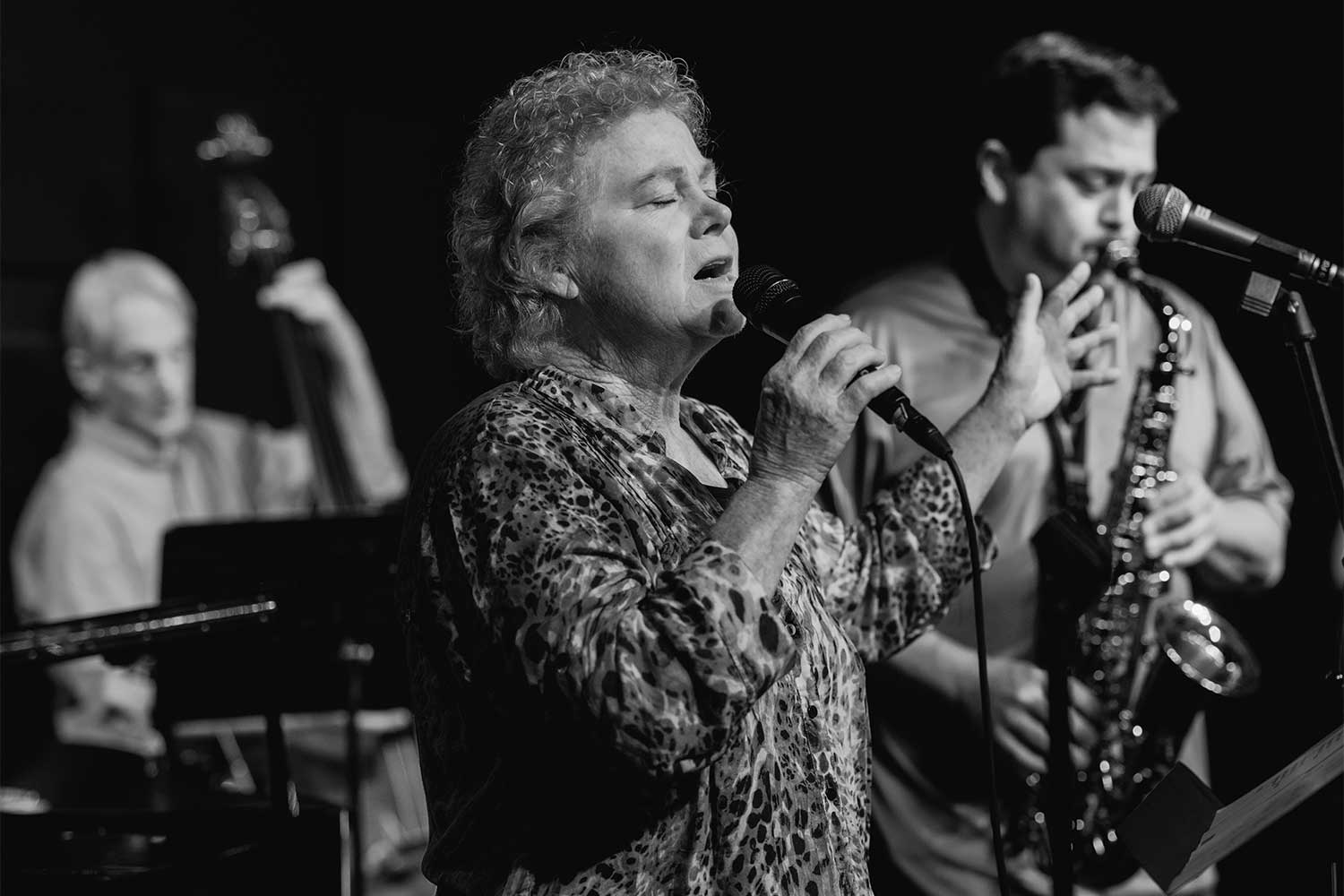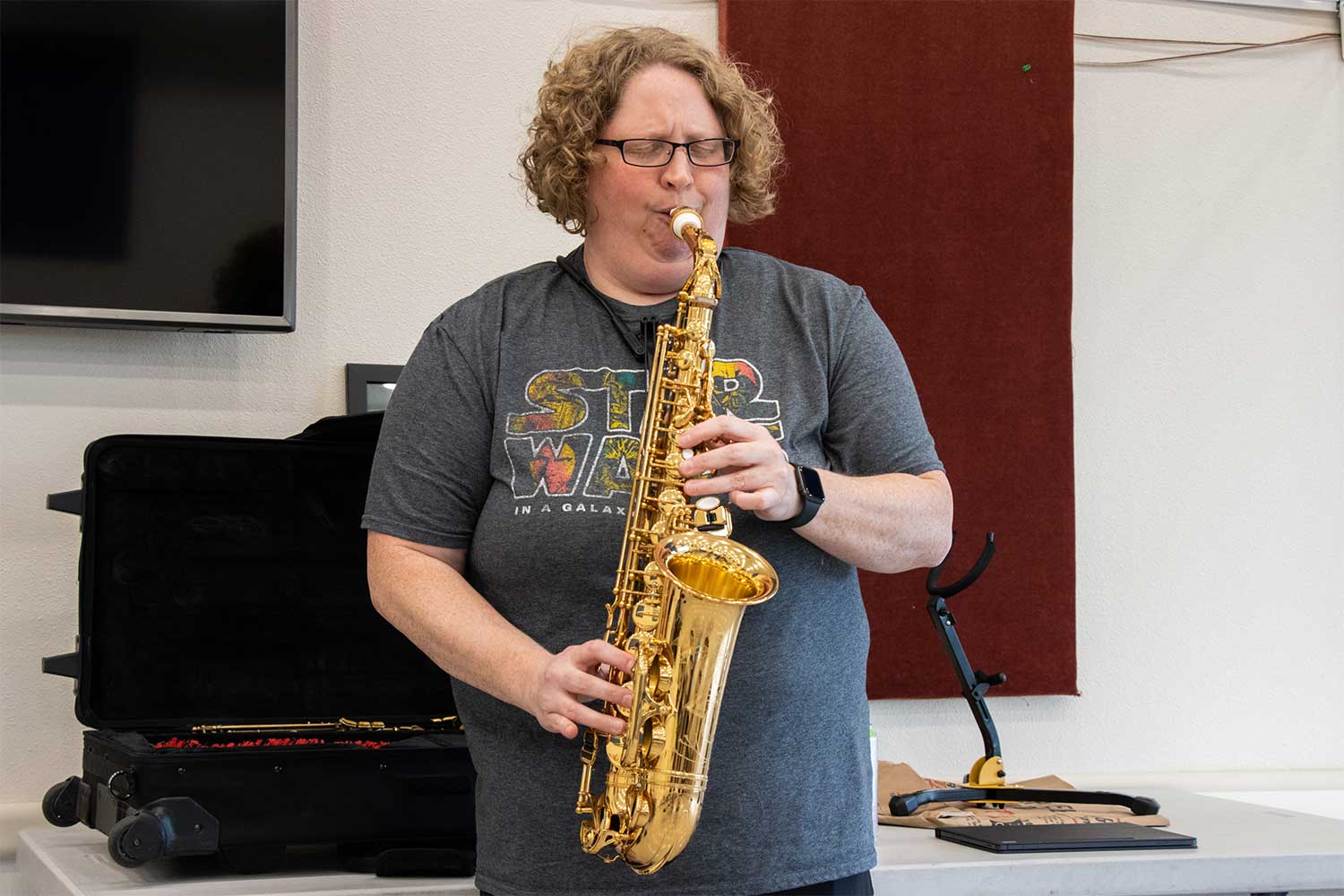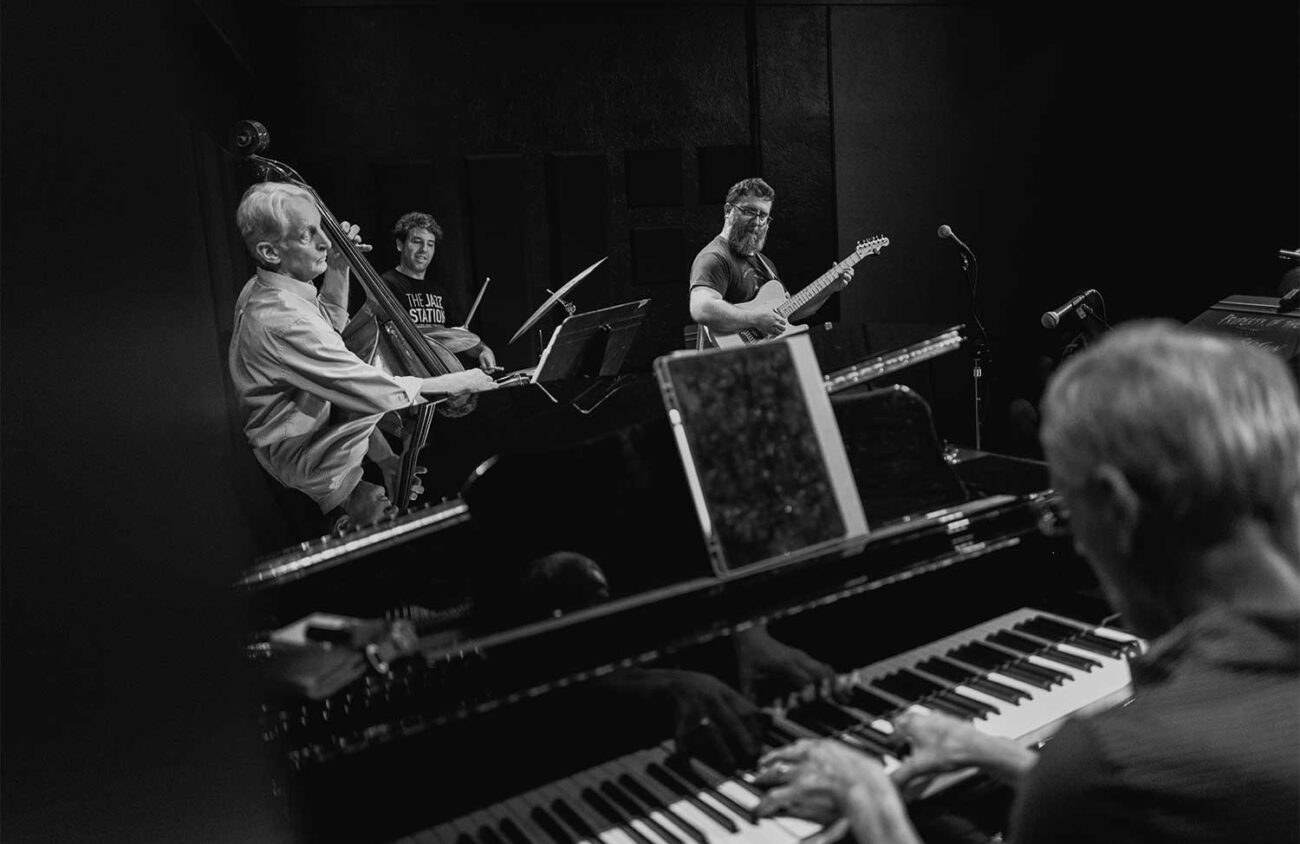Roger Woods has been performing jazz for decades. He started his career in the Washington, D.C., and Baltimore areas in the 1980s before moving to Eugene in the mid 1990s. He played in Portland for a few years after that and immersed himself in Portland’s scene.
However, Woods did not play many gigs in Eugene until around 2015. It was during this time that jazz here was being revitalized, as younger musicians were getting involved.
“All these young kids came on to the scene and they just injected some new energy into the local scene that we actually didn’t have,” Woods says.
The development and dedication of these young players are critical for keeping jazz alive. Eugene not only serves as a training ground for younger musicians who want to go elsewhere, but it also has a small yet thriving scene. With continued community support, venues such as The Jazz Station and educational programs that teach the next generations about this unique American artform will guarantee that jazz in Eugene is here to stay.
Local vocalist Nancy King got her start here, gigging in the 1950s at the University of Oregon with fellow students Glen Moore and Ralph Towner. Moore and Towner would later gain fame with their group, Oregon, while King eventually settled in Portland and became renowned for her improvisational skills. Local big band Swing Shift Jazz Orchestra formed in 1979 and is still around today, bringing jazz and swing music to a new generation of listeners.
“My primary interest first and foremost is just to do what I can to contribute to the longevity and the life of the band,” says Adam Harris, Swing Shift’s director.
The group will be doing that with an upcoming performance Oct. 28 at the Wildish Theater in Springfield. The show will feature Darmon Meader, a renowned jazz vocalist and saxophonist who was a founder of the New York Voices, one of the most famous jazz vocal groups in the world. Harris is optimistic about the event.
“I think this Darmon Meader show hopefully is going to be very successful,” Harris says.
In addition to Swing Shift, a variety of jazz artists are well known in Eugene. Some have been involved for decades, while others are just getting started.
Younger musicians here have included Garrett Baxter, a bassist who studied jazz at the UO, and Evan Furrow, a 17-year-old drummer who is a Willamette High School senior. Baxter has since left Eugene and is now involved in Portland jazz, while Furrow aspires to play in New York.
Woods has played an important role in mentoring younger musicians. He says that he starts hiring these musicians to play with him as soon as they are ready. He aspires for them to find their own unique creativity.

“I just kind of get out of their way and then let them find themselves,” he says.
Saxophonist Joe Manis has also helped reinvigorate Eugene’s jazz landscape. Manis, who is from the area, played throughout his high school and undergrad college years before leaving briefly to attend the Eastman School of Music. He returned to Eugene in 2008 and has been here ever since.
In 2021, Manis started the Oregon Jazz Workshop, a summer program that offers instruction in small ensemble settings. It teaches participants ages 11 and older the fundamentals of jazz over a period of a few days. He organized it after a conversation with Woods, and they agreed that a jazz education program was needed, especially due to the isolation induced by the COVID-19 pandemic.
“We decided, ‘Sure, let’s go for it,’” Manis says. “And it worked out.” Since it started, the number of people who have participated has grown every year.
In addition to the summer workshop, Manis started an after-school workshop in October 2021 in his studio.
“We get together and we just play,” Manis says. “And then we do performances out in the community a few times a year.”
For a while, Eugene had a few small all-ages jazz clubs, including Theo’s and Luna. Musicians were able to play in places such as bookstores and bigger venues like The Shedd. The Shedd, though, is not geared just towards jazz. Jo Federigo’s Restaurant & Jazz Club on 5th Avenue was another place to perform. However, the music was downstairs in a bar, making it difficult for underage musicians to play there. Manis says that he would have to stand on the stairs — so legally he was not in the bar — when he wasn’t actually playing.
This all changed with the development of The Jazz Station.
The venue was the brainchild of John and Nancy Crider. They eventually brought Chris Orsinger into the fold, and the club opened in downtown Eugene in 2005. It was originally quite small and occupied the current pool room in the Cowfish, downtown on Broadway. Since the venue’s capacity at the time was around 25 seats, there was not a whole lot of space for performances.
That changed in 2011, when The Jazz Station moved into a larger location, also on Broadway, where it still is, and it now seats 68. The nonprofit Willamette Jazz Society runs the venue.
This new location has brought more national acts into an intimate venue. Renowned saxophonist Benny Golson has played there, and the well known group The Bad Plus will be performing sold-out shows on Oct. 18 and 19.
The success of The Jazz Station, however, would not be possible without its volunteers and community support.
“To have that community support, it really begs for a friendly place,” says Orsinger, who was president of the Willamette Jazz Society from 2005 to 2014. “The volunteers enjoy meeting the patrons.”
Jamming has long been an important aspect of jazz. The Jazz Station encourages this by hosting Jammin’ with the Pros, an event where instrumentalists and vocalists can play with the professional musicians in Eugene. It occurs on the second and fourth Wednesday of every month. They must be good at their craft — it’s not a place for newbies who have never played jazz before — but it is an opportunity for musicians of all ages to perform a few tunes at a supportive venue.
“You don’t have to be the greatest saxophone player, you don’t have to be the greatest singer, but you do have to be prepared,” says Dona Clarke, founder of Jammin’ with the Pros.
“One of the things I’m most proud of is the people that come in, our regular community,” she adds.
John Heller, current president of the Willamette Jazz Society, wants to continue bringing jazz to the next generation.
“That’s absolutely great to keep the young people involved because it helps expand everything at the end of the day,” Heller says.
Roaring Rapids Pizza in Glenwood also hosts several jazz performances a year, especially in the summer.
“I’m enough of a musician to really appreciate how good the other musicians that I know are,” says Paul Roth, owner of Roaring Rapids and a former trombone player for Swing Shift. “So, I sort of made it my mission to just give them a place to play.”
Eugene’s jazz scene doesn’t lack venues; instead the challenge is to make it a more welcoming place for musicians who are not white men.

Erika Mittge, a saxophonist for the Swing Shift Jazz Orchestra, has noticed this firsthand.
“If you look at all the lineup of the groups that play at The Jazz Station, you have to go out of your way to find women that aren’t vocalists or maybe piano players,” Mittge says. She is the only female instrumentalist in Swing Shift.
“As a woman, I feel like I have to really prove myself first before I get that invitation to come and play,” she adds.
Olivia Fields, a saxophonist studying jazz as a master’s student at the UO, says this is an issue that students face, too.
“Female students, especially in jazz, are often overlooked by band directors and other people in the community,” Fields says. “We’re not seen as serious musicians.”
In addition, Eugene’s small size is affecting the diversity of jazz that is being offered. As such, local jazz musicians want to add more venues and events to increase Eugene’s status.
“I would love to see a jazz festival, because we don’t have one,” says Idit Shner, saxophonist and a member of the UO jazz faculty.
Despite these potential drawbacks, the future of jazz in Eugene looks bright. Not only is it developing the next generation of musicians here, but it is also serving as a training ground for musicians who aspire to go to bigger places, such as New York.
Perhaps the centerpiece of all of this is the UO’s jazz program. Steve Owen became the first director of the program in 1988, and the program has been thriving ever since. He retired as director in 2022 and was succeeded by Paul Krueger, the program’s current director.
When Owen arrived, all the university had was a big band and a few jazz courses, but not the full curriculum he desired. He has succeeded, as the UO now offers both bachelor’s and master’s degrees in jazz studies.
Owen, however, acknowledges the reality that most jazz musicians who graduate from the program are unable to make a living just by performing jazz. He says that the program uses jazz and its improvisational aspect as a platform for studying music that can ultimately help students with whatever they desire to do in music.
“That skill set really bodes well for our students when they’ve graduated, whether they’ve gone into teaching, whether they’ve gone into playing professionally or do studio work or be engineers,” Owen says .
As the current director of the program, Krueger wants to continue Owen’s work in developing the next generation of jazz musicians.
“What we’re doing is we’re providing a rigorous curriculum with expert faculty for students at the University of Oregon who then are able to go out into the immediate community and apply those skills at a professional level with other musicians here around town,” Krueger says. The faculty includes saxophonist Shner, drummer Ken Mastrogiovanni, and Keith Brown, who has toured as pianist for renowned saxophonist Kenny Garrett.
It isn’t just the UO that is contributing. Willamette High School’s jazz band, under the direction of Joe Freuen, won state championships in 2019, 2021 and 2022. Along with feeder middle school Shasta, it has played an integral role in developing young jazz musicians. These include Wes Georgiev, who has since gotten his jazz degree at Portland State University, settled in New York, and is now in Switzerland for an artist residency, and current senior Evan Furrow.
Freuen credits the support of the Bethel School District, of which Willamette is a part, as one of many reasons why Willamette’s jazz program has been successful.
“They were just willing to put resources behind it and put money for staffing,” Freuen says.
Willamette’s jazz students are also contributing to Eugene’s scene and playing with many veterans. Furrow, for instance, has performed with several artists, including Woods and Manis. Collaborating with them has been valuable, and networking and learning from them will be crucial to pass on jazz to the next generations.
“It feels nice to be the youngest person in the band, because I can learn from everyone else,” Furrow says.
